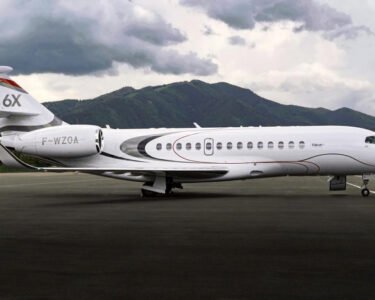
Airbus Corporate Jets
Then there were two. The second ACJ TwoTwenty was launched at Comlux’s completions center in Indianapolis, with a custom interior. But the staid, corporate cabin is unlike the first ACJ 220 launched last summer for Five Hotels and Resorts. That jet, designed for hourly charter out of Dubai, had a funkier, nightclub-like design, with colorful overhead lights tying its six zones together in a purple hue.
“This latest one has slightly more corporate styling, but uses 70 percent of the design of the first one,” Richard Gaona, chairman and CEO of Comlux, told Robb Report. “You see that, once you understand the concept of the A220.”

The second ACJ 220 interior has a very low-key, corporate look.
Comlux
Between leather, woods, seating arrangements, and other details, a blank-canvas ACJ 220 has 77 possible interior-design configurations. But it also uses the Airbus A220 commercial airliner as the foundation. The idea is to personalize the interior within a standard architecture, unlike a bespoke cabin that has to be engineered from scratch—which could add months or even years to the completions process.
“We sometimes start talking to clients 14 months before the aircraft reaches us,” says Ashley Moulton, a senior interior designer for Comlux Completion, during a tour last summer of the first ACJ 220 completions in Indianapolis. The second, just-completed interior was “green”—so called because it has a bare, often-green interior that was just getting started.

By contrast, the interior for Five Hotels resembles a nightclub.
Five Hotels & Resorts
This latest ACJ 220 took about eight months to complete, following the 14 months it took to finish the first interior. The process should become more streamlined as it moves forward. Comlux signed an agreement with Airbus to purchase the first 15 ACJ 220s, and four to six should move through the Indianapolis facility starting in 2026. The third ACJ 220 interior should be done by the end of this year, with the fourth arriving in a few days from the Airbus facility in Montreal.
The large hangar in Indianapolis has space for multiple aircraft, both used and new, all receiving new interiors. The cabins of the next two ACJ 220s will be similar to Five Hotels’s ACJ 220.
The Comlux facility is large, with multiple departments, including a design showroom and boardroom for clients. Since everything in the aircraft must be lightweight and fireproof to pass certification, creative solutions are often necessary. For stone countertops, Comlux uses a significantly lighter composite look-alike, while real, razor-thin wood veneers are bonded to acoustic-foam panels. The monuments—galleys, lavatories, and stowage compartments—are finished in workshops, then moved to a mock-up of the plane. The process is as much art as technology.

The ACJ220’s private suite at the rear of the aircraft includes a shower.
Comlux
This approach to saving time and money on an intercontinental business jet, without compromising quality, has been adopted by ACJ’s competitor, Boeing Business Jets, which announced a similar program recently. It is offering 144 cabin layouts for its 737-7 business jet. “It allows us to offer the jet at a very attractive, fixed price,” said BBJ president Joe Benson.
With 15 aircraft sold, the ACJ 220’s semi-custom business model has proven itself, while making Airbus a viable alternative to ultra-long-range offerings from business-jet makers like Gulfstream, Bombardier, and Dassault.




